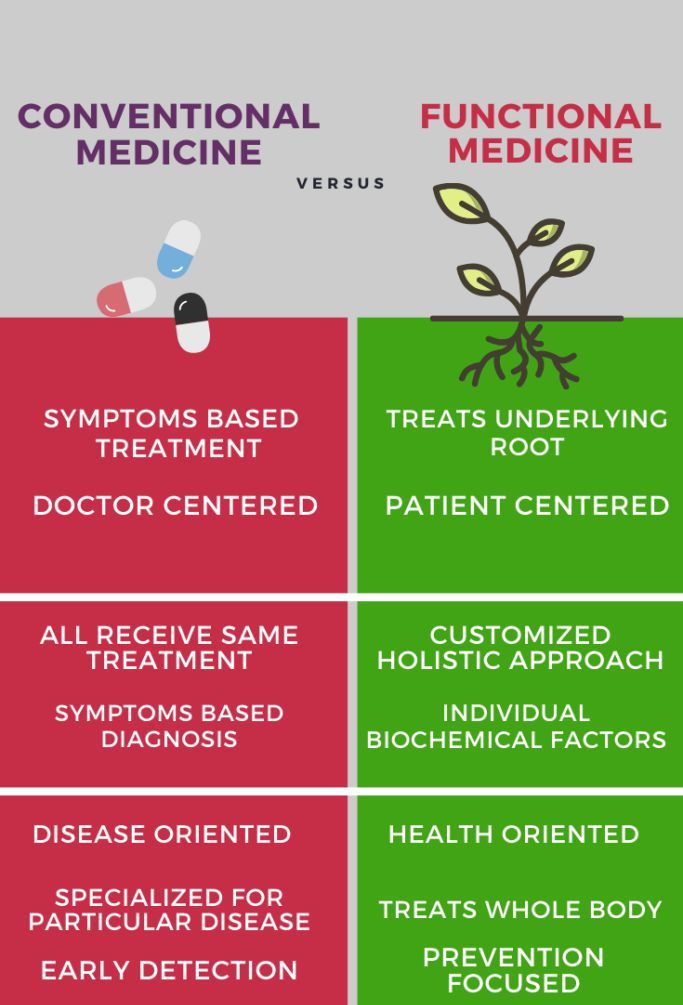Introducing the Recovery Strategies of Functional Medicine and Holistic Medicine for Ideal Wellbeing
The exploration of functional and holistic medicine discloses distinctive yet intertwined pathways to health and wellness. Functional medicine looks for to uncover the underlying root causes of disorders, while holistic medicine welcomes a wider perspective of wellness that consists of spiritual and emotional dimensions. Together, these strategies provide a structure for individuals to take fee of their health trips. This conversation will highlight the principles, methods, and distinctions in between these methods, inviting additional consideration of their consolidated potential.
Recognizing Functional Medicine: Concepts and Practices
Functional medicine stands for a standard shift in health care, stressing a patient-centered strategy that looks for to recognize and address the root root cause of ailment (Learn More). This model incorporates clinical research with professional experience, seeing clients as special people as opposed to mere symptoms of a condition. Specialists of useful medicine employ a systems biology perspective, exploring the interactions between genetic, ecological, and lifestyle aspects that add to health and wellness outcomes
Secret principles include personalized therapy strategies customized to the individual's specific needs, cultivating a collaborative connection in between person and professional. Functional medicine likewise prioritizes precautionary treatment, focusing on way of life alterations, nutrition, and stress and anxiety management to sustain overall well-being. This approach encourages patients to take an energetic duty in their wellness, leading to improved outcomes and a deeper understanding of their conditions. Inevitably, practical medicine intends to recover equilibrium and advertise health, changing the medical care experience right into among empowerment and alternative recovery.
The Holistic Medicine Strategy: Incorporating Mind, Body, and Spirit
While many health care methods concentrate exclusively on physical signs and symptoms, holistic medicine highlights the interconnectedness of mind, body, and spirit in the pursuit of excellent wellness. Learn More. This integrative technique acknowledges that emotional and emotional factors considerably affect physical health, leading experts to consider the whole individual during treatment. Alternative medicine employs varied methods, consisting of nutrition, way of living, and meditation adjustments, to foster equilibrium and consistency within the individual
Experts typically engage individuals in discussions regarding their emotions, connections, and life experiences, recognizing that these elements can affect total wellness. By dealing with underlying issues and promoting self-awareness, all natural medicine intends to empower individuals in their recovery trip. This paradigm change urges an aggressive method to health and wellness, supporting for preventive procedures and lifestyle modifications instead than just dealing with signs. Inevitably, all natural medicine seeks to cultivate a much deeper connection in between mind, spirit, and body, assisting in thorough well-being and individual development.
Trick Differences Between Functional and Holistic Medicine
Although both functional and holistic medicine focus on thorough individual treatment, they vary noticeably in their methods and approaches. Functional medicine highlights a systems-oriented method, focusing on identifying and treating the underlying root causes of diseases. Experts usually utilize advanced analysis screening and customized treatment strategies, which might include lifestyle adjustments, supplements, and drugs to recover equilibrium within the body's systems.
In contrast, holistic medicine takes on a wider point of view, thinking about the emotional, spiritual, and ecological elements affecting a person's wellness. It seeks to promote general wellness through a mix of alternate treatments, such as yoga exercise, acupuncture, and reflection, alongside traditional treatments.
While functional medicine is more medically oriented, emphasizing biological procedures, alternative medicine emphasizes the interconnectedness of different life facets (Functional Medicine). Ultimately, both approaches seek to enhance individual wellness, yet their fundamental concepts and treatment techniques identify them especially
Typical Problems Dealt With by Functional and Holistic Medicine
Many clients look for both functional and holistic medicine for a variety of typical health and wellness problems. These techniques are commonly employed to address chronic health problems such as diabetic issues, hypertension, and autoimmune problems. Functional medicine concentrates on identifying underlying causes through complete analyses, while holistic medicine emphasizes the interconnectedness of the spirit, mind, read review and body.
Mental health and wellness problems, including stress and anxiety and depression, are also frequently dealt with within these structures, as they think about psychological and emotional aspects along with physical signs and symptoms - Read More. Additionally, digestive system conditions like cranky digestive tract disorder (IBS) and food level of sensitivities prevail concerns, with both techniques promoting for dietary alterations and way of life adjustments
Patients may also transform to these modalities for conditions such as chronic exhaustion syndrome and fibromyalgia, where standard treatments might fail. By incorporating different healing techniques, useful and alternative medicine purpose to promote total well-being and enhance top quality of life for those impacted.
Just how to Choose the Right Technique for Your Health Journey
Just how does one identify one of the most ideal health technique in the middle of the myriad of choices readily available? The decision between practical and all natural medicine calls for mindful consideration of private demands and choices. One must evaluate their health and wellness objectives, whether they look for symptom relief or a deeper understanding of underlying issues. Next off, evaluating one's medical history and existing conditions can offer clarity on which strategy might be most helpful.
Assessment with healthcare professionals experienced in both fields can offer beneficial insights. Understanding the principles of each approach-- functional medicine's concentrate on organic systems and all natural medicine's focus on the entire individual-- can aid in making an educated choice. Additionally, considering personal values and convenience with treatment methods, such as different treatments or dietary modifications, is necessary. Eventually, a tailored approach that straightens with one's lifestyle and ideas will certainly foster a more efficient wellness journey.
Frequently Asked Inquiries
Are Functional and Holistic Medicine Covered by Insurance Policy Strategies?
Insurance policy protection for functional and holistic medicine differs considerably by strategy and provider. Some insurance provider may supply partial compensation, while others do not cover these different strategies whatsoever, requiring out-of-pocket repayments from clients.
Exactly How Lengthy Does Treatment Usually Absorb These Methods?

Can I Incorporate Functional and Holistic Medicine With Traditional Treatments?
Yes, people can integrate practical and holistic medicine with conventional therapies - Holistic Medicine. This integrative method might improve overall wellness, yet seeking advice from health care service providers is important to assure safety and security and efficiency in managing therapy plans
What Qualifications Should Experts of These Methods Have?
Experts of functional and holistic medicine ought to have appropriate levels in medicine or health sciences, together with specialized training in their particular areas. Accreditations from recognized companies boost reputation and guarantee adherence to developed criteria of treatment.
Exist Certain Diet Regimens Recommended in Functional or Holistic Medicine?

In holistic and practical medicine, certain diet regimens often include whole foods, plant-based choices, and removal diet plans customized to private needs. Emphasis rests on nutrient density and avoiding processed foods to boost total wellness and well-being.
